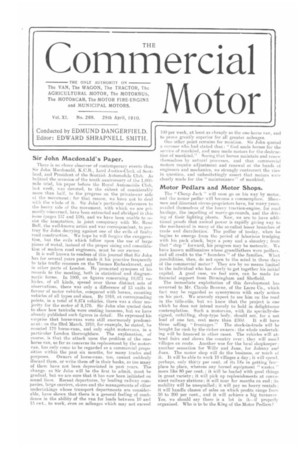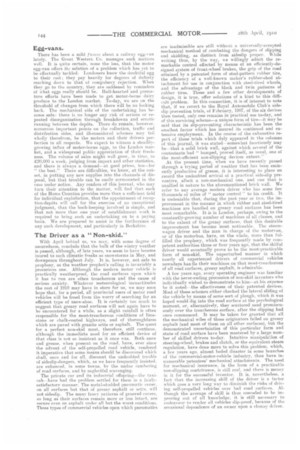Motor Pedlars and Motor Shops.
Page 1

Page 2

If you've noticed an error in this article please click here to report it so we can fix it.
The " Cheap Jack " will soon go on his way by motor. and the motor pedlar will become a commonplace. Shcmmen and itinerant circus-proprietors have, for many years. availed themselves of the heavy traction-engine, for road haulage, the impelling of merry-go-rounds, and the driving of their lighting plants. Now, we are to have additional proofs that animal power is rapidly giving way to the mechanical in many of the so-called lesser branches of trade and distribution. The pedlar of to-day, when he begins to emerge from the period of laborious trudging with his pack aback, buys a pony and a shandry; from that " step " forward, his progress may he meteoric. We have known millionaires whose grandfathers were pedlars. and all credit to the "founders " of the families. What possibilities, then, do not open to the mind in these days of the commercial motor 'they are by no means limited to the individual who has slowly to get together his initial capital. A good case, we feel sure, can be made for financial support from Birmingham and Sheffield.
The immediate exploitation of this development has occurred to Mr. Claude Browne, of the Lacre Co., which fact. may be regarded as synonymous with early action on his part. We scarcely expect to see him on the road in the title-role, but we know that the project is one which he does not intend merely to hold in delightsome contemplation. Such a motorva,n, with its speeially-designed, unfolding, shop-type body, should not, for a net load of one ton, cost more than ;C:500. It will have three selling " frontages." The stock-in-trade will be bought for cash by the richer owners: the whole undertaking will be financed in other easeS. The vehicles will attend fairs and shows the country over; they will assail villages en route. Another woe for the local shopkeeper : another sensation for Willy and Jane, for Johnny aml Joan. The motor shop will do the business, or much of it. it will be able to work 10 villages a day; it will spend. perhaps, only thirty per cent. of its life in getting frnr• place to place, whereas any horsed equipment " wastes more like 80 per cent. ; it will be loaded with good things in great. variety ; it will pick up replenishments at convenient railway stations ; it will tour for months on end its mobility will be unequalled; it will pay no heavy rentals : it will handle classes of sales on which profits range from 50 to 200 per cent., and it will achieve a big turnover. Yes, we should say there is a lot in it—if properly organized. Who is to be the King of the Motor Pedlars F
There has been a mild furore about a railway egg-van lately. The Great Western Co. manages such matters well. It is quite certain, none the less, that the motor egg-van offers tiic solution of a problem which has yet to be effectually tackled. Londoners know the doubtful egg to their cost ; they pay heavily for degrees of dubiety reaching down to that of compulsory rejection. When they go to the country, they are saddened by reminders of what eggs really should be. Half-hearted and premature efforts have been made to get motor-borne dairy produce to the London market. To-day, we are on the threshold of changes from which there will be no looking back. The mechanical side of the undertaking has become safe: there is no longer any risk of serious or repeated disorganization through breakdowns and erratic running between the depots. There do remain, however. numerous important points on the collection, traffic and distribution sides, and ill-considered schemes may fail wholly therefrom, be the motors and their drivers perfection in all respects. We expect to witness a steadilygrowing influx of motor-borne eggs, to the London market, and a widespread public appreciation of their freshness. The volume of sales might well grow, in time, to 220,000 a week, judging from import and other statisties, and there is always a demand—at good prices, too—for " the best." There are difficulties, we know, at the outset, in putting any new supplies into the channels of disposal, but that trouble can be easily surmounted in the case under notice. Any readers of this journal, who may turn their attention to the matter, will find that each of the Home Counties provides more than a sufficient field for individual exploitation, that the appointment of reception-depots will call for the exercise of no exceptional judgment, that the hook-keeping involved is simple, and that not more than one year of establishment work is required to bring such an undertaking on to a paying basis. We are prepared to assist in the furtherance of any such development, and particularly in Berkshire.
The Driver as a "Non-skid."
With April behind us, we may, with some degree of aesuredness, conclude that the bulk of the wintry weather is passed, although, of late years, we seem to have become inured to such climatic freaks as snowstorms in May, and downpours throughout July. It is, however, not safe to prophesy, as the weather prophet's calling is invariably a precarious one. Although the modern motor vehicle is practically weatherproof, the road surfaces upon which it has to run are often treacherous and the cause of serious anxiety. Whatever meteorological inexactitudes the rest of 1910 may have in store for us, we may soon hope that, for a period, all provincial users of motor road vehicles will be freed from the worry of searching for an efficient type of snow-shoe. It is certainly too much to suggest that greasy road surfaces will not again have to be encountered for a while, as a slight rainfall is often responsible for the mast-treacherous conditions of limestone or chalk-coated highways, and of thoroughfares which are paved with granite setts or asphalt. The quest for a perfect non-skid must, therefore, still continue. although the immediate need for an efficient device of that class is not so insistent as it once was. Both snow and grease, when present on the road, have, ever since the advent of the self-propelled road vehicle, rendered it imperative that some means should be discovered which shall, once and for all, discount the undoubted trouble of sideslip-dangers, which, as we have frequently insisted, are enhanced, in some towns, by the undue cambering of road surfaces, and by neglectful scavenging. The private car and it industrial offspring—the taxicab—have had the problem settled for them in a fairlysatisfactory manner. The metal-studded pneumatic cover, on all surfaces hut that of greasy asphalt or setts, will not sideslip. The many fancy patterns of grooved covers, NO long as their surfaces remain more or less intact, are secure even on asphalt under all hut the worst conditions. Those types of commercial vehicles upon which pneumatics are inadmissible are still without a universally-accepted mechanical method of combating the dangers of slipping and skidding, as distinct from sideslip proper. 14 lb writing thus, by the way, we willingly admit the remarkable control effected by means of an efficiently-designed system of front-wheel brakes, the grip of the road attained by a patented form of stud-pattern rubber tire, the efficiency of a well-known maker's rubber-shod attaehment for use in conjunction with steel-tired wheels, and the advantage of the block and twin patterns of rubber tires_ These and a few other developments of design, it is true, offer solutions of a kind to this difficult problem. In this connection, it is of interest to note that, if we revert to the Royal Automobile Club's sideslip prevention trials, of Fabruary, 1907, of the six devices then tested, only one remains in practical use to-day, and of this surviving scheme—a unique form of tire—it may be said that its slip-preventing characteristic has been the smallest factor which has insured its continued and extensive employment. In the course of the exhaustive report of these trials which duly appeared in the columns of this journal, it was stated—somewhat facetiously may he—that a solid brick wall, against which several of the contestants had " bumped, proved itself, as usual, one of the most-efficient non-slipping devices extant."
At the present time, when we have recently passed through a trying period of weather that has been eminently productive of grease, it is interesting to place on record the undoubted arrival of a practical side-slip preventive, albeit a non-mechanical one, and one that is unallied in nature to the aforementioned brick wall. We refer to any average modern driver who has some few thousands of miles of " motor control " to his credit. It is undeniable that, during the past year or two, the improvement in the manner in which rubber and steel-tired machines are handled on greasy road surfaces has been most remarkable. It is in London, perhaps, owing to the constantly-growing number of machines of all classes, and to the extent of the greasy surfaces, that this desirable improvement has become most noticeable. The steamwagon driver and the man in charge of the motorvan, or of the motorbus, have, on the whole, more than fulfilled the prophecy, which was frequently made by competent authorities three or four years ago, that the skilful driver would eventually prove to be the most-practicable form of non-skid. The unperturbed manner in which nearly all experienced drivers of conmiercial vehicles nowadays hanile their machines on that most-treacherous of all road surfaces, greasy asphalt, is admirable.
A few years ago, every operating engineer was familiar with the never-ending procession of non-skid inventors who individually wished to demonstrate to him—at his expense be it notedthe effectiveness of their patented devices. Most of these schemes either checked the lateral sliding of the vehicle by means of some sort of plough, which it was hoped would dig into the road surface at the psychological moment, or, alternatively, they scattered sand promiscuously over the treacherous surface, after the slipping had once commenced. It may be taken for granted that all the mechanical wiles of these originators failed on greasy asphalt (and most of them on all other surfaces), but the demonstrated uncertainties of this particular form and state of road surface have been mastered by a large number of skilled drivers to-day. Intuitive manipulation of steering-wheel, brakes and clutch, or the equivalent steam regulation, have done more to solve this problem, which, a few years ago, almost boded disaster in some branches of the commercial-motor-vehicle industry, than have innumerable patentees' mechanical attachments. The need for mechanical insurance, in the form of a practicable non-slipping contrivance, is still real, and there is money in it for the successful inventor. It is, nevertheless, a fact that the increasing skill of the driver is a factor which noes a very long way to diminish the risks of driving self-propelled vehicles over had road surfaces. Although the average of skill is thus conceded to be improving out of all knowledge, it is still necessary to endeavour to render all vehicles slip-proof, because of the occasional dependence of an owner upon a clumsy driver.






















